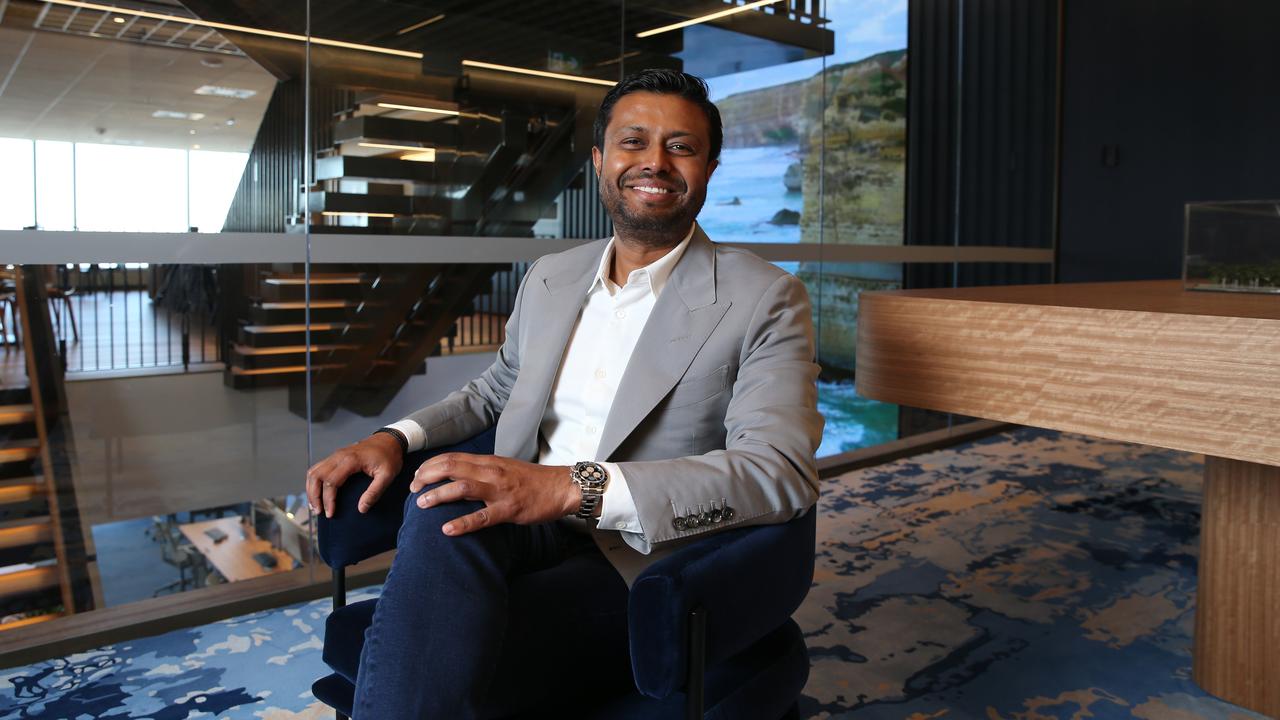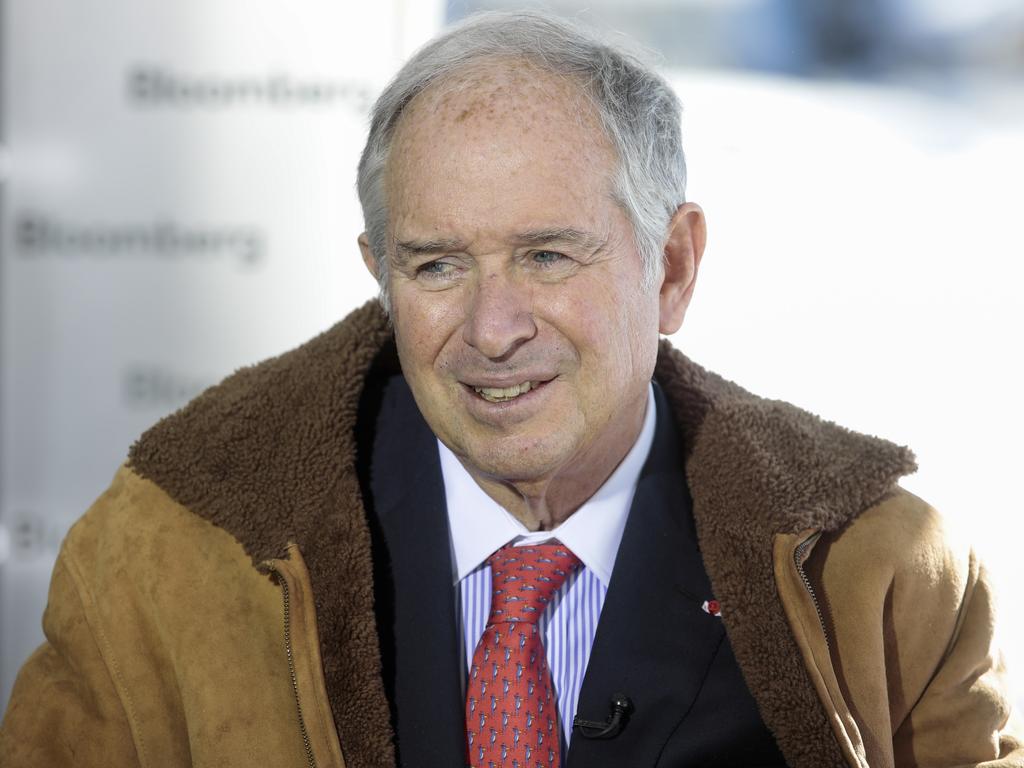Behind AirTrunk CEO Robin Khuda’s plan to become a $100bn colossus
Robin Khuda, the founder of data centre operator AirTrunk, reckons driving the company to a valuation of $100bn won’t be that difficult. Here’s how he plans to do it.

Business
Don't miss out on the headlines from Business. Followed categories will be added to My News.
AirTrunk founder Robin Khuda is adamant he can build the data centre operator into a $100bn colossus after selling the business this week to US private equity behemoth Blackstone for $24bn.
The deal – one of Australia’s biggest – had a price tag more than eight times the valuation when Macquarie Asset Management and PSP Investments bought into the business in 2020.
Mr Khuda, 45, recalls once giving a presentation to his new backers, saying he could build AirTrunk into a $10bn business – less than half what Blackstone bought it for.
“There were a few people who laughed at me,” Mr Khuda told The Weekend Australian.
But nobody doubts him now. When he says he will reach a goal, he means it. It has been the key to building his multibillion-dollar empire, the sale of which has catapulted him into the upper echelon of the nation’s richest people and cemented his status of one of Australia’s most successful tech entrepreneurs.
“We’ve always been ambitious,” he said.
“Of course we got the benefit of Covid, which accelerated the migration to the cloud. Now with AI there’s a significant amount of growth coming up, so we were at the right place and right time in terms of going through this big structural change in our industry. “They used to say if you buy IBM, you’re never going to lose your job. And the same thing applies to AirTrunk. Our customers know ‘if we sign up with you, we know you are going to deliver on time, (provide) good quality’. There’s a lot of value to it. That’s why we’ve been winning bigger market share than anyone else, not only in Australia but Japan, Singapore, Hong Kong, Malaysia, and all those markets.”

The sale to Blackstone – codenamed Project Amidala in reference to the Star Wars character – capped off a series of heady days for Mr Khuda.
He had dinner with Anthony Albanese at the Perth home of AirTrunk chairman and Fortescue deputy chairman Mark Barnaba with other business leaders on Tuesday night, before catching the red-eye flight back to Sydney.
Mr Khuda says he hardly slept as he took calls from Blackstone executives, his advisers and lawyers. But when the ink finally dried on the contract there was a giant six-litre bottle of champagne to share with staff at the company’s headquarters in Sydney.
They had reason to celebrate. Mr Khuda and his colleagues will share in a $3bn windfall, thanks to a generous equity program.
But he said he had only just begun. Blackstone has retained him to run AirTrunk, which he founded nine years ago after stints at ASX-listed data centre operator NextDC and running Fujitsu’s local operations.
Unlike NextDC, he has eschewed the mass enterprise market, serving just eight customers.
But those customers are among the world’s biggest companies – Microsoft, Google, Amazon and Oracle – and are all jostling for pole position in the AI race. AirTrunk is the main beneficiary of their rivalry and investment.
This is how Mr Khuda intends to create a $100bn business.
“It’s not that difficult if you think about it,” he said. “We’re $24bn. We only have to grow four times pretty much to get to that level.
“If you look at the growth, it’s really four or five customers – it’s Microsoft, it’s Google, it’s Amazon, it’s Oracle. And if you’re not doing business with these customers, your business model doesn’t exist. That’s the reality.
“Between them, they’re looking to deploy $US200bn in new investment in cloud infrastructure just this year. If you extrapolate the next four or five years, there’s a $1 trillion investment. This company (AirTrunk) is going to support their growth.”

Crucially, Mr Khuda said AirTrunk had a head start on its rivals, including those with vast landholdings looking to enter the data centre market and capitalise on the AI boom, which the federal government expects will inject up to $600bn a year into Australia’s economy by the end of the decade.
“All of these (data centre) customers are highly sophisticated. They are the biggest companies in the world. They will operate more data centres than anyone else. And to convince them you can do a better job than them is not easy – that’s a big barrier to entry,” he said.
“I’ve seen a lot of property groups that want to do a data centre but they’re sitting on land because they can’t get customers. These customers are signing 15-20 year contracts. They need to know can these guys operate, can these guys build it? That sort of expertise is pretty critical.”
Mr Khuda had an Asia-focused mindset when he founded the company, launching in Hong Kong and Singapore to take advantage of the undersea cable connectivity that provides a gateway to the region. He said this set the company up to expand across Asia, with AirTrunk now operating 11 data centres – one in Johor Bahru, Malaysia, three in Hong Kong, two in Tokyo and one in Singapore, in addition to its four Australian centres.
“Building in Asia is hard. If you look at Australian businesses, not many businesses have successfully executed in Asia. Doing business in Singapore is very different to doing business in Sydney, Melbourne. Japan is like a great country for holiday but probably one of the most difficult markets to do business with, because they don’t trust foreigners, etc. So it takes a long time. And I think one of the great things about our business, since day one, we had a focus in Asia. Our model is Asia-centric.”
Mr Khuda praised Macquarie as an investor, saying it helped grow AirTrunk’s business. Not only that, it helped AirTrunk create its own ‘‘millionaires factory’’.
But he said Blackstone could take the company to the next level, helping it become a $100bn business. “There isn’t any other bigger infrastructure investor in the world than Blackstone. They believe in this AI. Steve Schwarzman (Blackstone CEO) openly talks about it as the fifth industrial revolution – they’re fully bought into it.”
More Coverage
Originally published as Behind AirTrunk CEO Robin Khuda’s plan to become a $100bn colossus








